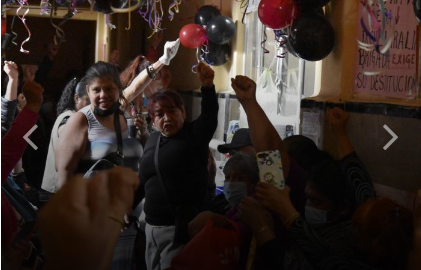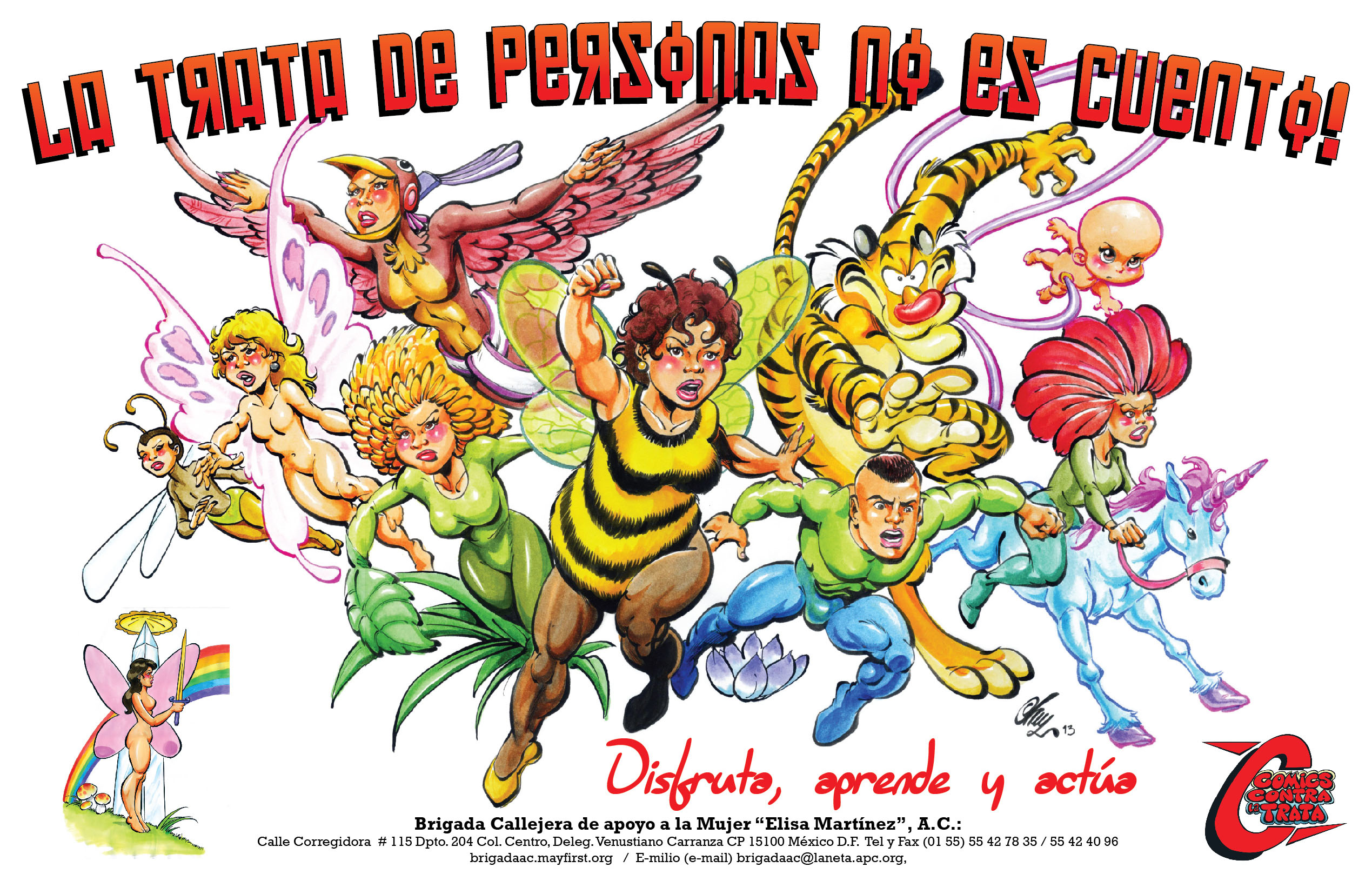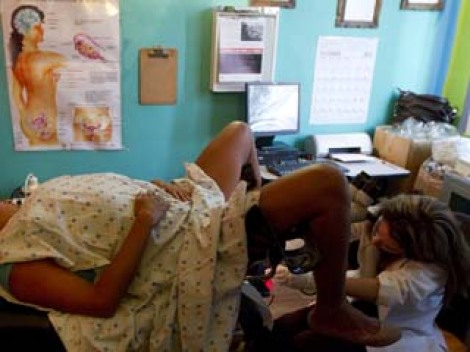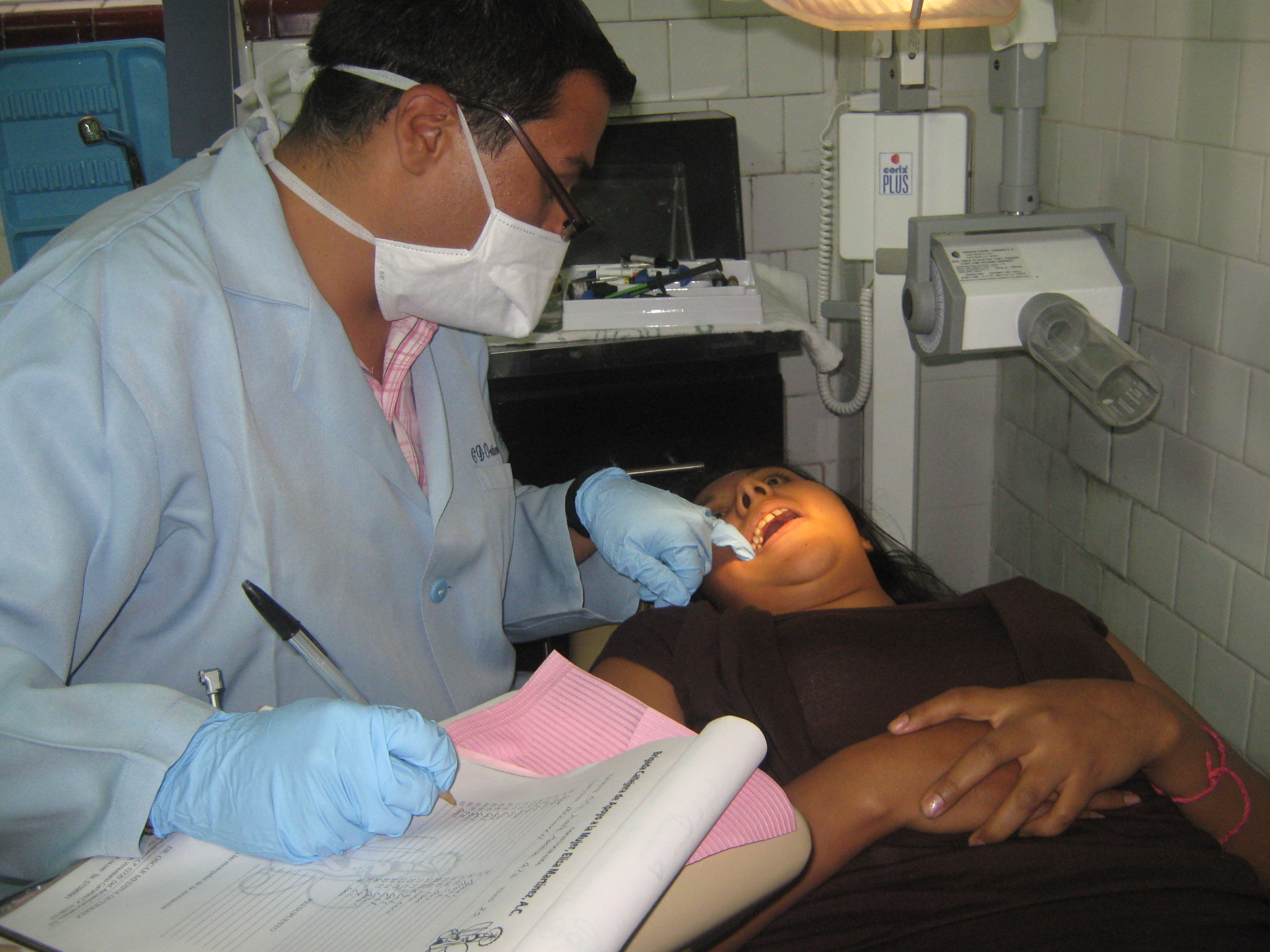
“Mamá Elvira,” the woman who rescues victims of human trafficking in Mexico
Elvira Madrid’s glassy eyes show a weariness accumulated for weeks. Last night she could hardly sleep because a “companera,” as she calls women who work in prostitution, was murdered in Tapachula, Chiapas. He received eight bullets for refusing to pay the housing racket extortion demanded of him by the southern capital’s known trafficking criminal organizations. At the same time, she has been battling all week with the authorities who certify schooling in Mexico so they can re-examine the compañeras she teaches to read and write in the capital’s red-light district. To top it off, he has a birthday party thrown at his office by Vero, a sex worker he’s been helping for years who gathers the neighborhood’s prostitutes to eat cake, sing, and dance. At least this latest engagement puts a smile on his face.
The festive crowd of women who gather in this section of La Merced, the neighborhood known for prostitution, call her “Mama”, although many are older than her, who is 55 years old. Among the guests is Gaby, who, after running away from her pimp boyfriend and being unable to return to her city because of the stigma, found the Madrid Association an opportunity to study nursing and attend university. One of those who organizes the banquet is Rosa, who finds time in her corner before or after work to come here and learn to read. Dina, who still bears the marks of her husband’s abuse on her face, doesn’t stop thanking Elvira Madrid for helping her get her papers out. They are all the support they don’t get from the police or the government, they are their only protective network on the street.
Between the walls of this office, which is papered with sexual health awareness posters and banners calling for union formation, these women have found shelter, food, education, psychological and medical help, and legal advice. La Brigada Callejera is the project Madrid built with her late husband Jaime Montejo more than 30 years ago. The two started a movement to ensure that women who engage in prostitution do so safely and freely.
Archive image of Elvira Madrid with a sex worker.Archive image of Elvira Madrid with a sex worker Pedro Cote Baraibar
When Elvira Madrid first set foot in La Merced, she was 19 years old and involved in sociological research with her university. “We all saw the girls being taken away by the police,” she recalls. It was 1986 and the practice of charging flat fees from the authorities was widespread, much more common than it is today, according to witnesses in Madrid. If the girls didn’t pay, they could be fined 1,500 pesos (almost $75). At the time, most of them charged 50 pesos ($2) for the service, and because they couldn’t afford it, they spent several days in jail while their children waited for them in the hotels where they lived with their mothers , not knowing when they would come back, they see.
Four students decided to stay: Madrid, her sister and two classmates. One of them was Jaime Montejo, a former M-19 guerrilla who fled to Mexico after government reprisals following the peace process. Together they created a small initiative in the square of the parish of Santa Cruz and Nuestra Señora de la Soledad. Father Héctor Tello allowed them to set up a communal kitchen and give out condoms. “So they killed a girl here every week, the pimp himself ordered their killings when they tried to escape. We went to a lot of wakes in that church,” he says. Shortly thereafter, they built a small doctor’s office and an office to work in. Then came psychological help and a teacher from the government to start the process of teaching women to read and write. In parallel, Madrid has made agreements with a selection of clinics to ensure they have access to surgeries and medicines, as they cannot be treated in hospitals alone, although many are infected with AIDS. “We sent them and they didn’t receive them or they treated them badly. The appointments lasted because she wasn’t a priority and they ended up dying,” Madrid recalls.
When the archdiocese closed this project in the church, they moved into an old, dark apartment that the sex workers found on Corregidora Street. It was further removed from the atmosphere of violence and drugs that poisons these streets in the heart of Mexico’s capital, a few streets down where tourists stroll through the Zócalo. Between the market lanes, whose colorful awnings are so crowded that they block the sunlight, a few women stand like statues, heroically enduring the pain in their feet on the acrylic platforms.
Elvira Madrid moved by a speech by a sex worker remembering her late husband Jaime Montejo.Elvira Madrid moved through a speech by a sex worker remembering her late husband Jaime Montejo, Micaela Varela
In La Merced they have become part of the landscape, but it is impossible to know who is there voluntarily and who, at the end of the very long days, gives all the money to one man, the pimp. It’s impossible for the outside eye, but not for Madrid.
In order to have a presence on the streets, he recruited several sex workers to become health promoters. Women he trained with basic sex education notions to encourage condom use in corners, but also with a keen eye to spot sex slaves. “It is easy for them to recognize them. They are women who don’t speak to their partners in hotels, you never see them laughing or smiling and they’re looking at the floor all the time,” describes Madrid. When a promoter identifies one, they notify the brigade. It is they who break their chains with the pimp, give them a chance at another life and, if they have children hostage, use media cameras to search for them. Elvira Madrid, who is 1.60m tall, has lost count of the number of times she has stood with outstretched arms in front of pimp houses and has not left until she has freed the women and children who were holding her captive. “That’s why I don’t have children, I know that would be the only way to control me,” Madrid adds.
When the pimps lose their most important asset, they swear revenge. The first time they threatened her was one of the most feared pimps in the neighborhood, the one running La Merced with the support of corrupt cops. Madrid had freed several women from its tentacles, so he wasn’t surprised when he returned home to find several police cars with no license plates. Pedro Cote, a friend of the couple who worked as a reporter for the United Nations and lived nearby, arrived in time to see the hooded police officers start beating Elvira Madrid. “Jaime tried to defend me but there were too many. They grabbed him between several and started choking him, I got strength I don’t know where and I took the gun from a police officer, I pointed it at his head and told him ‘Either you let him go or damn it them again,” says the sociologist. Pedro Cote didn’t show up in time to witness the scene, but he insists nothing surprises him. “They were a very special couple, they were together 24 hours a day, they only broke up to go to the bathroom. I see them quite capable of that. Everything for Jaime,” says Cote.
Jaime Montejo poses for the camera to show the wounds after being beaten by the police.Jaime Montejo poses for the camera to show the wounds after being beaten by the police. Pedro Cote
Madrid received many blows that day. Thanks to the presence of a United Nations worker, the episode did not escalate as the operation had promised, when between punches and punches they yelled at her that they would rape her so that she would always remember it. After several years of trying to seek justice, they gave up. “Even with the support of the United Nations, we were never able to continue the indictment,” says Cote resignedly.
The threat of more beatings was ever-present for Elvira Madrid and Jaime Montejo and continues years after that night. Only now are Madrid alone to deal with them. Jaime died on May 3, 2020 as the Covid crisis in Mexico had overwhelmed hospitals. Desperate, Jaime carried the sick women in his arms and searched for a medical center where they would be treated. Madrid assures that this is how her husband got infected. “They had nobody, we couldn’t leave them then. And that was the reason for his death. I will never forgive the government,” Madrid tearfully condemned.
Continuing her solo project, Elvira Madrid says she notices her husband’s absence most when “there is danger,” like when she was threatened at the end of the year for reporting the presence of trafficking victims in La Merced. “On one of my tours, three women came up to me and asked for help. They were taken away immediately. What is the agency doing so stupid? To ease his frustration, he continues to walk the streets of La Merced with educational pamphlets to give to prostitutes, which contain condoms of the brand he founded to cut costs. Despite her struggle, she still receives criticism from the abolitionist wing of feminism, although she doesn’t worry and downplays it, saying it was a speech “from a privileged middle and upper class”. “We can’t choose for them, what will you offer them when it’s the only thing they know?” sentence.
Elvira Madrid on one of her tours of La Merced to distribute condoms while the sex workers tell her about their problems.Elvira Madrid on one of her tours of La Merced to distribute condoms while the sex workers tell her about their problems. Micaela Varela
Subscribe here to the EL PAÍS México newsletter and receive all the informative keys on current affairs in this country
MEDELLIN, Colombia | Solange Bouchard, 54, was previously part of the Orchester symphonique de Longueuil. Her 25 years in the orchestra make her one of the proud deans of the group. Energetic and passionate, she happily opened up to the changes that come with the Maestro’s arrival
• Also read: “Stradivarius in Vienna”: from Longueuil to Medellín.
• Also read: Opening night for the Longueuil Symphony Orchestra in Bogota
“It’s wonderful to make a living from music,” says the Howick musician. I wanted to be a violinist in an orchestra, I wasn’t interested in being in the foreground. Being part of a whole is what excites me, my joy is when we are together! »
This stimulating togetherness, which has become like a family, has been managed by a certain Alexandre Da Costa since 2019. A very talented soloist who has known Solange since he was young and studied with him at the Montreal Conservatory of Music.
“It’s absolutely impossible not to engage with the intensity of Alexandre,” affirms the mother of three, all of whom have been involved in music. He gives so much, he is so generous with his game, time and energy that you want to give it all too! »
live a dream
The violinist could never have imagined one day flying to South America with the Orchester symphonique de Longueuil. A quarter of a century after her audition, she is still pinching herself while currently playing first violin on the stages of major theaters in Colombia and Brazil.
For the experienced musician, whose father is a violinist and his mother is a crazy music lover, making music under the direction of Alexandre Da Costa means a gentle letting go and a kind of awakening from the heart.
“My symphony while sitting, I do that with other orchestras,” explains the one who is called to play the violin standing with Da Costa. So, yes, why not otherwise with Alexandre! From the moment I got involved there I followed and have been having a lot of fun ever since. »
It also praises the heterogeneous but complementary aspect of the group of musicians that make up the orchestra. Especially from the 33 participants of this first South American tour, with whom she feels at home. The energy of the young, she says, blends well with the experience of the older.
Still the stage fright
She also shares her stage desk with Roxanne Sicard (see other text), the youngest musician in the orchestra.
“One of the old hands and the youngest!” laughs the one who toured with Bruno Pelletier in 2000 and who will join Mario Pelchat in September.
“I obviously still have stage fright and I don’t want it to go away,” she adds, eyes shining. And then we’re still learning from others, even after 25 years, and that’s the beautiful and stimulating thing. »
The trip Stradivari in Vienna by Alexandre Da Costa and the Orchester symphonique de Longueuil will continue in Brazil until August 18th. The ensemble will perform at the Municipal Theater in Rio de Janeiro tonight and at the B32 Theater in Sao Paulo on Wednesday.
“Alexander’s deep motivation corresponds to my values”
Roxanne Sicard during the concert in Medellin, Colombia.
Photo Sarah Emilie Nault
Roxanne Sicard during the concert in Medellin, Colombia.
At 26, Roxanne Sicard is one of the youngest OSDL musicians. She had just landed her position as a violinist last May when she realized she was about to fly off with the orchestra on a tour of South America.
At the age of three, Roxanne Sicard saw the film Violins of the Heart and it changed her life.
“I’ve always wanted to play the violin,” says the young woman from Joliette. I didn’t come from a musical family at all, but I had a hard head. My parents lent me a violin for my birthday and gave me lessons. I have never asked myself any questions about my career choice. »
After various formative experiences and seven years studying at the Conservatoire de Musique de Montréal, she is proud to be part of the Orchester symphonique de Longueuil and to work with the conductor Alexandre Da Costa, who has his unique way of conducting.
The sense of belonging to this group also gives him great pleasure.
dream job
“Alexandre is inspirational,” she says. His personality is so close to the audience, that’s the most important thing. Because what we learn in school is very sharp, but we have to reach the public. »
Both because she has always loved doing different things and because she was chosen by a violinist and “full musician” she has a hard time understanding what is happening to her.
“I’ve worked really hard to get to where I am today, which is what I wanted, even though it was difficult. It’s fun to have the chance to do a job you love. Every morning I get up and feel happy. I can’t come back yet! »
The tour in brief…
Solange Bouchard of the Longueuil Symphony Orchestra
Photo courtesy of Marc Dussault
A first concert in Brazil
After Colombia, the Stradivarius tour conducted by Alexandre Da Costa continues in Vienna, Brazil. The ensemble shone at the Sesi Theater in Porto Alegre (whose modern version was inaugurated in 1997) on Sunday night. Porto Alegre is the capital and largest city of the state of Rio Grande do Sul and has 1.5 million inhabitants.
A maestro in clothes by Quebec designers
Solange Bouchard of the Longueuil Symphony Orchestra
Photo Sarah Emilie Nault
Alexandre Da Costa proudly wears clothing from Quebec designers during the tour. In Bogota, he wore a frock coat by Thailand-born Quebec designer Nathon Kong. On the back of the Maestro’s tailored jacket were the conductor’s sheet music and a picture of his Stradivarius. In Medellin he wore – with style! – a black skirt by designer Denis Gagnon.
Because Costa’s son the controls
Solange Bouchard of the Longueuil Symphony Orchestra
Photo courtesy of Marc Dussault
At the age of 8.5, Mattenzo Da Costa already has 5 years of experience in the music field (piano, singing, directing). While touring – and since the age of five – he has shared the stage with his famous father to stage Radetzky’s March. “I’m very tempted to be like dad,” he said. If he can play the violin and conduct, I can play the piano and sing. My father inspires me! »
https://www.spamchronicles.com/mama-elvira-the-woman-who-rescues-victims...
- Inicie sesión o regístrese para comentar









